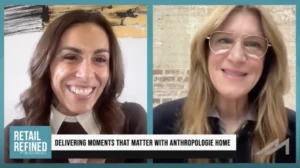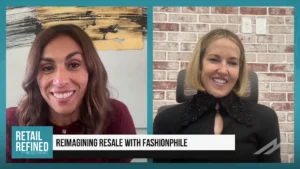Can Businesses Prevent Retail Theft Without Hurting Their Customer Experience? Here’s What’s Working.
Last year, retail theft caused businesses to lose a staggering $112.1 billion. Released by the National Retail Federation, these findings indicate a 19.4% increase compared to the previous year. From brands like H&M announcing enhanced anti-shoplifting measures to Target closing nine stores, retail theft is having serious repercussions on retailers and shoppers. Is there a way for businesses to prevent retail theft while keeping customers happy?
Some businesses are already taking steps to prevent retail theft, though these rollouts have been anything but smooth for operations and the customer experience. Earlier this year, clothing chain Zara announced plans to replace hard tags with RFID chips, although their easy removal from clothing items sparked shoplifting concerns and reportedly led to a delay in the global rollout. Shoppers at a Giant Foods store in Washington, D.C. now need to furnish their receipts before leaving the outlet, putting the scent of distrust in the air for customers. Another common strategy to prevent retail theft, locking up more small-ticket but high-churn items behind plexiglass, is becoming standard across most big box retailers, but it’s leaving shoppers frustrated; “I don’t appreciate being treated like a criminal,” one anonymous customer complained in a Sun report.
Other more inviting and experience-focused strategies, though, are working to deter crime for retailers like Tractor Supply Co. In a retail landscape where inventory shrinkage cost companies more $100 billion last year, Tractor Supply Co. has managed to buck the trend by implementing adequately staffing their locations. By ensuring that a substantial number of team members are present to engage with customers and prevent retail theft through increased vigilance and customer interaction, Tractor Supply actually saw a decrease in inventory shrink in 2022 over 2021. It’s continued to see shrink numbers dip throughout 2023.
Associate Professor of Marketing at William & Mary, Ronald L. Hess, who is renowned for his expertise in customer experience and satisfaction within the retailing and services industries, explains how businesses should approach building strategies to prevent retail theft while keeping customers happy.
Ronald’s Thoughts
“My understanding is [that] it has gone up, especially this year. It’s gone up, you know, another four to five billion dollars from my understanding. And I think your reports are good as well.
Like recently, Target talked about this problem going to cost them as much as a billion dollars. If you look at retail and, you know, its profitability anyway, it’s pretty slim. They don’t have great margins, mostly. So a billion dollars is quite a bit off the bottom line, right? The interesting thing that I’ve kind of also noticed is there is some discussion that it is not possibly all theft, that sometimes this could be operational failure. This could be, you know, supply chains that are not working as efficiently or it’s last mile kinds of issues right in the store. So, you know, they’ve said that can be as much as 26% of the reasons these things happen.
But it doesn’t change the fact that the majority of this is really, it’s theft. And we’ve seen in the vivid pictures and the vivid videos of some of the things that have gone on. I think there has been some reclassification of these kinds of crimes from what used to be more felony oriented to now misdemeanors, right? I think that has certainly not been a good thing for retailers. I think it’s been interesting in the last two years or so that on the other side, there’s a bunch of states that have actually increased their legislation and introduced bills to make punishment a little more severe for these kinds of crimes. So it’s interesting.
You know, you asked about tactics that maybe some retailers are using. I think some of the bigger ones may be using some trade groups to push for some of these legislations, which I think is an interesting way to go about it, whether that’s going to work or not. You know, it’s hard to hard to know. It certainly can’t hurt. Well, none of them are positive, unfortunately, when it comes to this. This is not going to enhance customer experience. Right. But, you know, let’s just kind of go through some of the tactics that are used and some are more interesting than others.
I think, as you said, some have gone to the extreme to where they lock up certain brands of products, you know, and it appears as though certain products are very much targeted. Right. So allergy medicines are for whatever reason, probably because of the expense, they are targeted. And some of the beauty products of certain types are targeted just because of how expensive those are. Right. But, you know, and some of those now have been locked up or secure in some ways. I mean, we’ve used security tags for many years, say, on a Gillette razor or something such as that. Some of the more interesting stores have gone to adding people at the exits just to review receipts. Right. And maybe they’re not thorough in terms of what they’re looking at, but just having their presence there, I think, deters, I think, a lot of some of [this] theft as a signal.
But again, you know, customers will feel like, you know, they’re being singled out or you don’t trust them. And that doesn’t usually go well with a customer experience in a positive way. In some of the, I think some of the issues, is not so much closing stores down, but in some poor neighborhoods where there may be a grocery store where it’s the only place to shop, you know, theft has become even more of a problem. And I think some, I think I read that Giant basically replaced a lot of brand name products that were typically stolen with private label products. Right. So that’s an interesting, I think, strategy that may have a less direct impact on, you know, the customer experience. They won’t feel like they’re being prosecuted.
You know, I think, you know, to understand the other side of this, criminals see that I can take you know, I can steal these these branded merchandise and I can go to a marketplace like an eBay or an Amazon and sell. Right. And that business is certainly a lot risk, risky than going, you know, and dealing drugs or, you know, running guns or something like that. So, I think they see it as this is a really great, you know, opportunity for me. But without the brand name, that’s really going to deter some of this. It’s going to make it more difficult because they’re looking for the brands. Right. If they have the brands and they can sell it to those marketplaces. Without them, it’s really problematic.
You know, as I said earlier, legislation has been working. It is going in the right direction. I think the other I guess the other tactic that’s often used is we have security guards in stores, which I think people are used to. But my understanding is that security guards are less likely to actually, even when they see something happening, actually go up to that person to try to stop them. They tend to call, you know, the police. So I’m not sure that’s working very well either. You know, [it’s] really the other than the taking the brands off the shelves. You know, that’s probably the one that’s a little less damaging to the overall customer experience. So it’s kind of an interesting subject. I feel, for the retailers. But I also, you know, it’s a, it’s a tough place. Our research team looks at this pretty carefully and, yeah, I have some pretty strong feelings about this other. You know, certainly, I think that just having people present is a deterrent. No question about it.
On the very positive side of that, I think we found plenty of, you know, proof, evidence that would suggest that if you staff correctly, your conversions are going to go up because you’re going to be able to help people. It’s like having a set of salespeople, right? And so you can staff up to a point. And I say that point because I think there’s a level where it doesn’t make financial sense from a gross margin standpoint to actually — they don’t pay for themselves, you know. But certainly, I think companies can do a very [nice] analysis to understand where that level is. And I think they have to realize that, you know, conversions can pay for a lot of great things and can allow them to add more staff. So yeah, I think that’s certainly going to make for a better experience overall for everybody involved.”
Article written by MarketScale.








